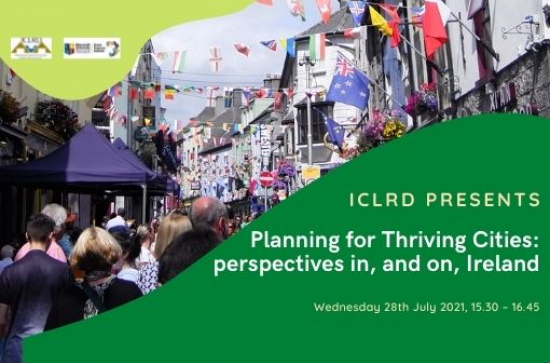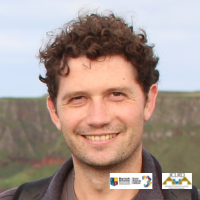
This webinar will explore how cities, on the island of Ireland and elsewhere, can envision and plan for more sustainable, inclusive, and thriving futures for all. Cities are central to many contemporary societal challenges. From climate change to the significant socio-economic inequalities exacerbated by the COVID-19 pandemic, urban populations are at the forefront of both the impacts and the actions needed to address these intersecting concerns. With increasing emphasis on community wellbeing, people and planetary health as key outcomes of development, cities including Amsterdam are adopting strategies such as the “City Doughnut” to drive their transformation, for example, towards a circular economy. As cities on the island of Ireland seek to progress their own agendas within this space, now is a critical moment to think about the future desired for our cities, reflect on experiences from other places and times, and learn about practical interventions happening in the here and now that can contribute to co-creating thriving cities.
Programme:
Moderator: Dr Andrew McClelland, Research Associate, Alliance Manchester Business School, University of Manchester & Senior Research Associate, ICLRD
Welcome from ICLRD Chair: Ms. Mary MacIntyre, OBE
Speakers:
Prof. Mark Tewdwr Jones, Professor of Cities and Regions at the Centre for Advanced Spatial Analysis, The Bartlett, UCL
Mr. John O’Hara, City Planning Officer, Dublin City Council
Ms. Rita Harkin, Northern Ireland Support Officer, Architectural Heritage Fund
Q&A
Register here
 Andrew has diverse research interests in the public policy challenges confronting places experiencing or emerging from crisis and conflict. He is currently working on the Recovery, Renewal, and Resilience from COVID-19 project which aims to develop a generalizable, theoretically underpinned framework for how recovery and renewal from the pandemic can enhance resilience. Andrew previously worked as a postdoc at the University of Liverpool (2018 -2020) where he coordinated and edited a series of COVID-19 Policy Briefs focused on the Liverpool City Region. Prior to that position, he led on a two-year project at Maynooth University under an EU-funded Marie Sklodowska-Curie Actions Fellowship. The latter included a focus on his specialist interests in heritage, cross-border cooperation, and public participatory methods. |
 Mark Tewdwr-Jones is Professor of Cities and Regions at the Centre for Advanced Spatial Analysis, The Bartlett, UCL. With a background in urban planning, geography, political science and film, Mark is one of the leading planners globally. His expertise covers urban and regional planning, strategic and spatial planning, planning engagement, digital planning, urban futures, and place-based policy. Over 30 years, he has produced 20 books, almost 100 research papers, attracted £24m in research income. He has worked in both central government (Government Office for Science, CLG and DEFRA advisor), and in local government, and advised cities globally. He has served on the boards of RTPI, Regional Studies Association, TCPA, and Connected Places Catapult. |
 John O’Hara is the City Planning Officer for Dublin City Council. He works closely with the Chief Executive, the Elected Members and external agencies in the management and delivery of strategic planning for the City, through the City Development Plan, Local Area Plans, and Strategic Development Zones (SDZ) schemes. Recently John was responsible for the Docklands and Poolbeg SDZ Planning Schemes. |
 Rita is the Northern Ireland Support Officer for the Architectural Heritage Fund (AHF), a UK-wide charity and social investor in heritage. She manages the Heritage Transformed programme, funded by the Department for Communities (DfC), the Pilgrim Trust and the Garfield Weston Foundation. Heritage Transformed helps charities and social enterprises find uses for buildings at risk through a combination of advice, grants and loans, with a focus on communities of need. Over the last 3 years, Rita has helped to develop the Village Catalyst pilot – an innovative cross-departmental programme led by DfC and the Department for Agriculture, Environment and Rural Affairs (DAERA) which aims to reuse historic buildings and tackle rural poverty and social isolation as a result. Prior to her role with AHF, Rita worked with Ulster Architectural Heritage and she currently serves on the board of Hearth Historic Buildings Trust and Belfast Buildings Trust. |
